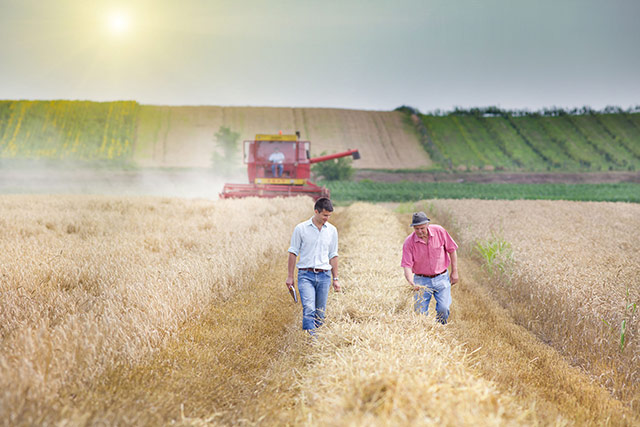Priorities for Irish agriculture


Speaking to Richard Halleron new Minister for Agriculture, Fisheries and Food Michael Creed has outlined his plans to help grow Ireland’s agri-food sector significantly over the next decade.
One of the first actions taken by Michael Creed TD, following his appointment to the position of Minister for Agriculture, Fisheries and Food at the beginning of May, was to fully endorse the strategy espoused by the members of the 2025 Agri Food Strategy Committee. Their report sets out a cohesive, strategic plan for the development of the agri-food sector over the next decade. The Committee has identified that opportunities will arise as a result of significant population growth and greater access to international markets. In addition, the group recognises that the increased pressure on global agricultural resources and the environment will offer the potential for further growth opportunity for the Irish agri-food and fisheries sector.
Creed firmly believes that the Food Wise 2025 report has harnessed the collective wisdom, foresight and knowledge of leading industry stakeholders and sets a course for the industry of smarter, greener growth over the next decade. It foresees a sector that acts more strategically and achieves a competitive critical mass in the international marketplace while targeting more quality conscious consumers who will recognise and reward Ireland’s food producers for their sustainable production and high quality produce.
The long-term vision as set out in the report is of ‘Local Roots Global Reach’ based on the continued development of the sector where efficient and environmentally-friendly production delivers sustainable export growth on global markets. The Committee believes that achieving this vision will benefit primary producers, processors and the food manufacturing sector, as well as the wider economy.
On the basis of available data and by taking the actions identified in the report, the 2025 Agri-Food Strategy Committee has set the following growth projections, which it believes are achievable over the next decade. These are:
- Increasing the value of agri-food exports by 85 per cent to €19 billion;
- Increasing value added in the agri-food, fisheries and wood products sector by 70 per cent to in excess of €13 billion;
- Increasing the value of Primary Production by 65 per cent to almost €10 billion;
- The creation of an additional 23,000 direct jobs in the agri-food sector all along the supply chain from primary production to high valued added product development.
To achieve the projections set out above, Food Wise 2025 identifies over 400 recommendations to achieve sustainable growth and these will require a concerted and coordinated approach by primary producers, industry, Departments and State agencies.

Steps to Success 2016
Steps to Success 2016 is the first progress report relating the progress made in securing the Food Wise 2025 targets. Launched mid-way through July, it confirms that, of the 330 detailed actions which were due to commence in 2015 or 2016, 28 per cent have been achieved or substantial action has been undertaken. A further 67 per cent have commenced and are progressing well.
Creed said: “This is a good start and I will press on to get as many actions as possible completed within the next year. Food Wise 2025 underlined the sector’s unique and special position within the Irish economy.”
While the medium to long-term prospects for Irish farming and food seem very positive, Creed is very mindful of the challenges in the here and now facing production agriculture. Of these the most pressing is the impact of volatility on global food markets.
He said: “Working to improve farm incomes is my key priority as Minister. I am very aware that a number of agri-sectors are under pressure at present as a result of current market difficulties. For this reason, the Irish Government sought a number of measures to be taken at EU level to help to stabilise the market and provide some cash flow assistance to hard pressed farmers.”
Commenting specifically on the problems now confronting Irish dairy farmers he explained that the medium term prospects for global dairy markets are good, adding: “How we mitigate the current volatility is the challenge. Volatility in dairy markets is a global problem, an EU problem and an Irish problem for which there is no single silver bullet. Fixed price and margin contracts, futures markets and access to increasingly flexible forms of credits are all part of the toolkit that will be required. The presentation from the processing sector today on their work to develop a collaborative price index for Ireland was well received and is a timely example of the kind of innovation required.
“One of my priorities under the Programme for Government will be to support the provision of lower cost and more flexible finance for the sector. I have now conveyed that message strongly to all of the banking institutions. When I met the bank CEOs last week I also stressed the need for them to be flexible in the context of increased income volatility and to show forbearance where their dairy farmer clients experience difficulties.”
Last December saw the COP 21 Climate Change strategy agreed in Paris. As a consequence, Creed wants Ireland to be a global leader in sustainable food production. “Our road to a low carbon economy includes an approach to carbon neutrality in the agriculture and land-use sector, including forestry, which does not compromise capacity for sustainable food production,” he said.
“We have a climate efficient agriculture sector, but more needs to be done to ensure that we are, and remain, the most sustainable producer in the world of milk, beef and other agri-food products. To succeed in our goals towards climate-smart agriculture and global leadership in this field, we must not only be environmentally, socially and economically responsive, we must also be coordinated and ambitious.”

Where redmeat is concerned, Creed views the securing of new export opportunities as being of critical importance for the future wellbeing of the industry as whole. It was no surprise then that he particularly welcomed the recent decision of the US authorities, greenlighting imports of Irish beef for grinding. He said: “I am delighted with this confirmation that the US authorities have recognised the equivalent standards overseen by my Department and granted access to Irish manufacturing beef, building on our existing access from last year. This is the culmination of over a year of intensive work between my Department and its US counterparts.”
This development follows a January 2015 decision to permit access for raw intact beef from Ireland to the US. Since then, there have been intensive discussions between both sides on a range of technical matters to extend access to manufacturing beef intended for grinding. The new US decision paves the way for Industry to undertake the necessary steps that will enable trade to commence.
Beef from the EU had been banned from the US since it imposed its ban for BSE reasons over fifteen years ago. This ban was only formally lifted in March 2014. Ireland was the first EU member state to secure market access post BSE.
Creed added: “The US market is a potentially huge prize given its size and the demand we know exists there for premium grass-fed beef. We already have first-mover advantage as a result of being the first EU member state to gain entry, which we have been exploiting through various marketing initiatives and this decision now creates an opportunity for industry to become involved in the export of manufacturing beef to the US.
“These exports will be supported by a marketing initiative promoting Irish manufacturing beef. Exports in 2015 and the positive start to 2016 suggest that there is opportunity for industry to capitalise on this potentially significant market outlet for Irish beef.”





